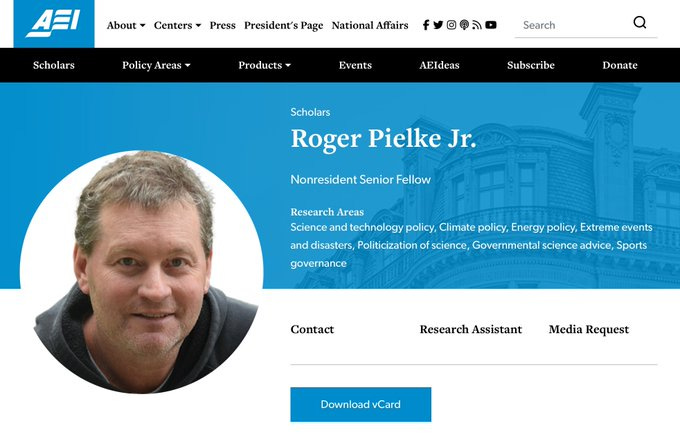Two quick items today, NOAA’s response and some big professional news.
Billion Dollar Disasters: NOAA Responds
The pre-print of my paper posted earlier this week, Scientific Integrity and U.S. “Billion Dollar Disasters,” has already been downloaded more than 20,000 times.1 Thanks to everyone who has already provided comments and suggestions — they have already made it better.
There has been only one news article that covered the pre-print, and it is excellent. The reporter, Kevin Killough, asked NOAA to respond to the paper::
An agency spokesperson told Just The News that the "billion-dollar disaster" product is based on two decades of research and close collaboration with public- and private-sector partners.
"The methodologies of the Billion Dollar Weather and Climate Disasters product are laid out in Smith and Katz, 2013, a peer-reviewed publication, and follow NOAA’s Information Quality and Scientific Integrity Policies," the spokesperson said.
NOAA’s unsupported claim that the billion dollar disaster dataset follows NOAA’s Information Quality and Scientific Integrity Policies is simply false. I provided numerous examples of NOAA’s failures to follow these policies that the press officer chose not to engage with. But don’t take my word for it, go look for or even ask NOAA for all versions of the dataset over the past 10 years and see what answer you get.
Smith and Katz 2013 is discussed in in my paper and reaches conclusions that actual fully support my analysis.2 Specifically, consistent with my own evaluation, Smith and Katz 2013 explain that the billion dollar disaster dataset is not adjusted for changes in exposure or vulnerably, but it should be if trends are to be properly interpreted, and if normalization were to be considered, trends would be reduced significantly — see the excerpt below.

Smith and Katz 2013 further acknowledges that the many factors that contribute to the tabulation of losses “makes any attribution to weather or climate, especially for billion-dollar disasters, difficult.”
In the absence of NOAA taking seriously the shortfalls in its billion dollar disaster dataset, a next step in seeking to improve scientific integrity at NOAA related to its billion dollar disaster database will be to file a “request for correction” to the agency.3 You can see an example of such a request to NOAA from PEER here. NOAA provides more information on the process.4
It is quite a sight to see a systematic, empirical evaluation breezily dismissed by a press officer at NOAA, but it is 2024 and that is where we are at!
Some Professional News
I am absolutely thrilled to share that I have joined the American Enterprise Institute (AEI) as a Nonresident Senior Fellow. AEI is establishing a new Center for Technology, Science, and Energy which will be led by AEI Senior Fellow Tony Mills.
Mills explains:
“From pandemics to climate change to artificial intelligence, science and technology are central to many of today’s most pressing issues. Yet both sides of our political divide are increasingly tempted by top-down, one-size-fits-all policies. We are founding CTSE because our country needs a humane alternative that understands science and technology as serving the goals of—and creating the conditions for—human freedom and dignity.”
Scholars at AEI work with complete academic freedom:
AEI operates independently of any political party and has no institutional positions. Our scholars’ conclusions are fueled by rigorous, data-driven research and broad-ranging evidence.
Our scholars not only engage in research that focuses on today’s most critical challenges but also look ahead to ideas and issues that have yet to be widely recognized. AEI scholars pursue innovative, independent work across a wide array of subjects. From economics, education, health care, and poverty to foreign and defense studies, public opinion, politics, society, and culture, our experts drive the competition of ideas.
AEI actively seeks and encourages engagement with those who hold different points of view. We welcome civil disagreement because we believe that a competition of ideas is essential to a free society. This is the same approach to scholarship that AEI has taken since our founding in 1938.
It is unusual in Washington, DC, to embrace open debate, intellectual freedom, and human welfare—and to do so unencumbered by partisan considerations and special interests. As a result, decision makers and leaders in Washington and across the country trust our work, and we are able to foster cooperation at a time of deep division in our country and abroad.
We believe that, together, we can make progress toward reform in many policy areas and create a better world for all people.
It is a privilege to be affiliated with one of the nation’s leading think tanks and to contribute to its new initiative in technology, science and energy. I am absolutely thrilled at the opportunity to work alongside and with leading policy scholars across the nation. For any policy researcher, joining a top think tank is bucket list stuff.
Some quick Q&A:
What does this mean for THB?
THB is going to keep on keepin’ on. My affiliation at AEI will open up new ways to increase productivity, perform deeper analyses, and have much greater policy impact. THB just got a huge boost.
What does this mean for my role at the University of Colorado Boulder?
To be completely honest, I am not sure. I’ve been quite open about the challenges I’ve faced in my home institution, especially over the past decade following attacks by the White House and Congress.5 I fully expect to always have a university affiliation and to continue to teach — where and in what role is presently uncertain. Watch this space.6
Your Support is Key
The new opportunities I have to do novel research, write with almost complete independence, and have significant policy impact is due to the subscribers of THB. My paper on NOAA’s billion dollar disasters may be the first peer-reviewed paper that formally acknowledges Substack subscribers. So thank you. We researchers are always asking someone to fund our work — federal agencies, foundations, philanthropists. I just happen to be making my case to you. I like it that way. So thanks for your support to date, and also to new supporters going forward as my professional roles continue to evolve!
I have many peer-reviewed papers that have never been downloaded 20,000+ times over decades. Substack is something else!
Adam Smith is the NOAA employee responsible for compiling and promoting the dataset over the past ~15 years. Smith and Katz 2013 is peer-reviewed but it is not an independent assessment. An interesting side note, Rick Katz was a close colleague of mine for many years at ESIG in NCAR in the 1990s and is an excellent statistician.
Anyone can file such a request. I have now done so intend to do so once my paper is through peer review.
The billion dollar disaster dataset provides some low hanging fruit for Congressional oversight. It is amazing to me that the many people and institutions who emphasize scientific integrity seem to have lost their voice on this issue — which is obvious and out in plain sight. As they say, partisanship is a heck of a drug.
One day I will say much more. That day is not today.
If you are at a university and interested in talking, let me know. I am open to all sorts of possibilities — except administration and a tenured position!






FYI, I have submitted a formal "request for correction" to NOAA's Section 515 Officer under Section 515 of the Treasury and General Government Appropriations Act for Fiscal Year 2001 (Public Law 106‑554).
Thrilled by the new you are joining the AEI. Perfect, and not surprising that they did not respond to a true scientific analysis of their shoddy work. What committee in the house would be responsible to oversee or investigate the obvious errors in the NOAA report. Perhaps we can reach out to the appropriate chair.
Congratulations